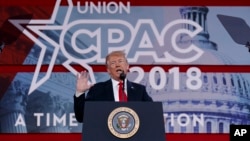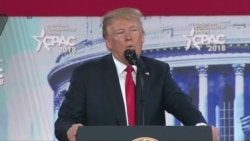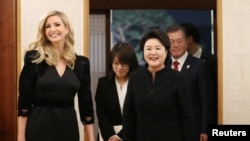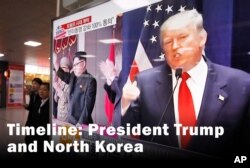After announcing what he called the “largest ever” set of sanctions against North Korea, U.S. President Donald Trump on Friday threatened a “phase two” if the measures aren’t effective.
“If the sanctions don’t work, we’ll have to go to phase two, and phase two may be a very rough thing,” Trump said, speaking alongside visiting Australian Prime Minister Malcolm Turnbull at the White House.
Trump did not specify what he meant by “phase two,” but suggested it would be “very, very unfortunate for the world,” adding: “Only time will tell.”
WATCH: Trump on North Korea Sanctions
Fifty-six entities targeted
Earlier Friday, Trump announced the “heaviest sanctions ever imposed” against North Korea, part of what the White House bills as a “maximum pressure” campaign against the North.
The sanctions target 56 entities — 27 shipping and trade companies, 28 vessels, and one individual — around the world, from North Korea to China to Tanzania, according to senior U.S. administration officials.
North Korea has long relied on a complex and shadowy global shipping network to evade United Nations sanctions that target its nuclear and ballistic missile programs.
Speaking to reporters in Pyeongchang Saturday, White House spokeswoman Sarah Huckabee Sanders said: “Hopefully we’ll see a change on the part of the North Koreans to start to denuclearize the peninsula, that’s what our focus is.”
Sanders added that “the president won’t make the mistakes the previous administration has and be soft or weak. He will continue to be strong and continue to put maximum pressure on North Korea.”
Sanders is accompanying Trump’s daughter and senior adviser, Ivanka Trump, who will attend the closing ceremony of the Pyeongchang Winter Olympics on the final full day of events Sunday as head of the U.S. delegation.
She is also meeting with senior South Korean officials, including President Moon Jae-in.
At a closed-door meeting before a dinner Friday night at the presidential compound, known as the Blue House, Moon told Trump that talks on denuclearization and the inter-Korean dialogue must move forward side by side, Moon’s press secretary, Yoon Young-chan, told reporters.
Trump responded by pushing for joint efforts by the U.S. and South Korea to apply maximum pressure on North Korea, Yoon said.
At the dinner for the U.S. delegation, Moon praised North Korea’s participation in the Olympic games “as an opportunity for us to engage in active discussions between the two Koreas and this has led to lowering of tensions on the peninsula.”
“I also believe that such developments are thanks to President Trump’s strong support for inter-Korean dialogue and I would like to express my deep appreciation on this point as well,” Moon added.
A high-level North Korean delegation is also attending the closing ceremony, but U.S. officials have said there will not be any meetings between the U.S. and North Korean delegations.
Since Trump took office, U.S. officials have given mixed messages on the idea of talking with the North, at times suggesting Washington is open to talks without preconditions and at other moments insisting Pyongyang must first commit to giving up its nuclear program.
The latest U.S. position, outlined by Vice President Mike Pence, is that the White House remains open to negotiations but that it will also keep up its campaign to diplomatically and economically isolate North Korea.
Earlier sanctions
Since August of last year, the U.S. has helped oversee three rounds of United Nations Security Council sanctions against North Korea. The pressure has not stopped Pyongyang from conducting more nuclear and missile tests.
Nonetheless, Treasury Secretary Steve Mnuchin told reporters U.S. sanctions are “beginning to have a significant impact” on North Korea’s ability to fund its weapons programs, though he did not provide any evidence for the assertion.
The U.S. on Friday also released a global advisory intended to alert the world to “deceptive shipping practices used by North Korea to evade sanctions,” according to a Treasury Department statement.
“The president has made it clear to companies worldwide that if they choose to help fund North Korea’s nuclear ambitions, they will not do business with the United States,” Mnuchin said.
But the new sanctions’ effectiveness depends on whether they can successfully be implemented.
And the U.S. has limited leverage over many of the shipping companies involved in helping North Korea evade sanctions, warns Gary Samore, former White House Coordinator for Arms Control and Weapons of Mass Destruction.
“A lot of the companies working with North Korea are very small,” Samore said. “And they don’t care whether they work with the United States.”
Jonathan Schanzer, a former Treasury Department official, praised the new sanctions for addressing North Korean shipping, which he says “has long been a gaping hole in the US sanctions regime.”
“The only thing missing here today is action against complicit Chinese banks,” says Schanzer, now with the Foundation for Defense of Democracies. “We know they continue to undermine our efforts to isolate North Korea.”
“Until we take that step, DPRK will be able to operate rather freely in the formal financial sector,” he said.
The new sanctions imposed on North Korea come despite a recent thaw in tensions between North and South Korea, which have been holding high-level talks.
Both as a candidate and as president, Trump repeatedly has made headlines about Pyongyang. He threatened to “totally destroy” North Korea and has suggested he would have China “get rid of” North Korean leader Kim Jong Un.


















